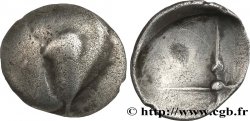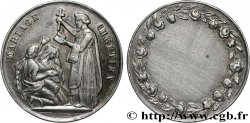正面
正面的文字 ANÉPIGRAPHE.
正面的说明书 Reste informe de tête humaine barrant le champ.
背面
背面的文字 LETTRES NON VISIBLES.
背面的说明书 Roue à quatre rayons avec moyeu central avec la trace de petites cornes avec de petites anfractuosités dans le champ.
评论
历史细节
SALUVII
(2nd - 1st century BC)
The Salyens controlled the Marseille region when the Phocaeans founded the city of Massalia in 600 BC.. -VS. Of Celtic-Ligurian origin, divided into a multitude of semi-independent tribes, the Salyens opposed the development of the Marseille city in the hinterland. From the second century BC, the Massaliotes required the help of their ally, Rome, to fight against the Salyens and defend themselves.. This request allowed the Romans for the first time to intervene in Transalpine Gaul in 154 BC.. -VS. in order to help the Marseillais to defend their counters of Antibes and Nice. Subsequently, the Romans from 125 waged a rapid war against the Salyens in order to prevent them from helping the Celto-Ligurian tribes of the Transalpine. They seized Entremont (Bouches-du-Rhône) in 124 BC. -VS. and destroyed it to rebuild it three kilometers away, thus founding the colony of Aquae Sextiae (Aix-en-Provence). Today, it is believed that the site was definitively abandoned during the invasion of the Cimbri and the Teutons at the end of the first century BC.. This invasion was perhaps the last occasion for the Salyens to revolt, at a date between 110 and 90 BC.. -VS. The final revolt of the Salyens occurred during Caesar's proconsulate in Gaul. Sources: Caesar (BC. I, 35, 4); Livy (HR. V, 34 and XXXV, 2); Strabo (G. IV, 178, 203); Ptolemy (G. II, 10, 8). Kruta Celts (22, 40, 187, 308, 338, 600-601, 806).








 对产品描述纠错
对产品描述纠错 打印
打印 分享我的选择
分享我的选择 提问
提问 Consign / sell
Consign / sell
 产品介绍
产品介绍












